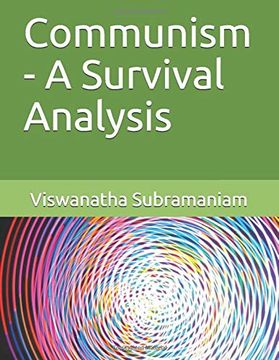Synopsis "Communism - a Survival Analysis"
Human generation try to fit into a 4 dimensional survival concepts comprising the Environment, Geography, Economic and Social dimensions, over centuries and their pedigree too progressed under these guidelines. Because of the divergent level of survival targets in the economic and social strata by each human being, wealth accumulation flows unequally among the people. Industrial revolution mechanised the human work, with cost reduction and quality/volume optimization and planted Capitalism in the world, creating a wedge in the wealth accumulation process. This inducted a class war between the owners of wealth versus the workers, who are hired and fired by them. Competition made the capitalist to realise the importance of labour and diluted their concept as “Socialism”. The disproportionate wealth accumulation among people seeded the concept of communism in the world. Communism originated by Marx in Germany, spread to Russia and was promoted by Lenin. Both assumed that the large volume of people in the world belong to the low wealth possessing worker class, will revolt towards equal wealth share, and Communism shall dominate the whole world soon. But both Marx and Lenin were “Social revolutionists” and lacked “futuristic management thoughts” on how the shared wealth will be recycled to grow more, and result in prosperity among the equally shared population ? With this limited thought, the USSR (1922) and the East Germany (GDR-1961) and were created, with the entire wealth of the nation pooled on the apex “State”, representing the entire population. The state became a monopoly and all the people were simple labourers, without any self possessions. The state utilised the labour like a commodity, without any motivation to use their original ideas and any incentive to improve the productive contribution spirit. As a result, the GDR collapsed in 1989 and the USSR dwindled in 1991, bringing an end to the 69 year old Communist concept. Also both started promoting the diametrically opposite Capitalist approach and established cooperation with the (imperialist) USA. Communism could have survived and continued as a guide for wealth and prosperity for all the nations and their people in the world, if the domestic population was considered as “superior” to the “state”. The national wealth owned by the “State” should have been invested in sectorial projects and entrusted to optimum group of people to work, manage and encouraged to meet a targeted quality volume. State should have met all needs of these groups of people. A reasonable share of the net gains should have been distributed in equal proportion to all the people involved, as an incentive. Below targets and loss should have been questioned and corrective action should have been taken. In addition, the productivity and management decision should have been oriented towards ‘Socio-economic Development units”. The domestic investment should be made from domestic savings and domestic technology should be manned by the domestic labour.

